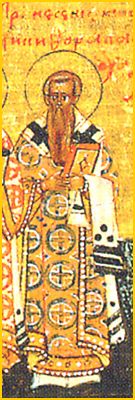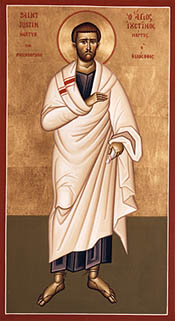|
|||
|---|---|---|---|
| This weekly bulletin insert complements the curriculum published by the Department of Christian Education of the Orthodox Church in America. This and many other Christian Education resources are available at http://dce.oca.org. | |||

The Church remembers Saint Justin the Martyr and Saint Nicephorus the Confessor. The titles Martyr and Confessor have different meanings, as we would expect. A martyr, which means "witness," is one who gives his or her life for the faith. A confessor is a person who does not actually die for the faith but witnesses to it under difficult and often dangerous conditions. The lives of these two saints make it clear that both kinds of witness demand courage and fortitude. The two men might both be described with a third title: apologist. The word "apology" in its original meaning doesn't have the connotation of making amends after having done something wrong. "Apologetical" writings are those that explain and defend the faith, which Justin and Nicephorus both did. Saint Justin, born to pagan parents, studied many forms of philosophy, searching among them for the truth about God. He was always left unsatisfied, and one day he met an old man who challenged him and got him to admit his dissatisfaction. The man told him about the writings of the prophets and the Savior they describe, urging him to read and to pray for enlightenment. Justin did read and pray, and became a committed Christian. Seeing the willing self-sacrifice of Christ's followers, he became even more convinced of the truth of their faith. Justin was able to save many Christian lives by writing his "Apologia," explaining the faith for those who were new to it. After reading this work, the Emperor Antoninus halted the persecution of Christians. In the following years, Justin convinced many people to become believers. When in the year 166 he faced martyrdom due to false accusations, he was able to answer the government official who asked him, "Do you think by dying you will receive a reward from God?" Justin replied, "I do not think; I know." Several centuries after Justin's martyrdom, in 806, Saint Nicephorus became Patriarch of Constantinople. He was immediately controversial, having reluctantly accepted appointment by the Emperor while still a layman. This appointment was unpopular with many monks and priests. There were also those who disapproved of some of his patriarchal decisions. Most significantly, as a staunch defender of the veneration of icons, he later came into conflict with an equally staunch enemy of icon veneration--the new emperor, Leo, who allowed him to be harassed and finally exiled him.
During his years of harsh isolation, Nicephorus wrote several apologetical works defending the importance of icons, never backing down in his insistence that they must be part of Orthodox worship. He declined all offers to regain imperial favor by renouncing his views, and died in 829. Martyrs and confessors acquired certainty about the faith through prayer, study and effort. They dared to say things like, "I do not think; I know." In our day, when such words might well bring accusations of arrogance and exclusivity, we need their example more than ever. |
|||

